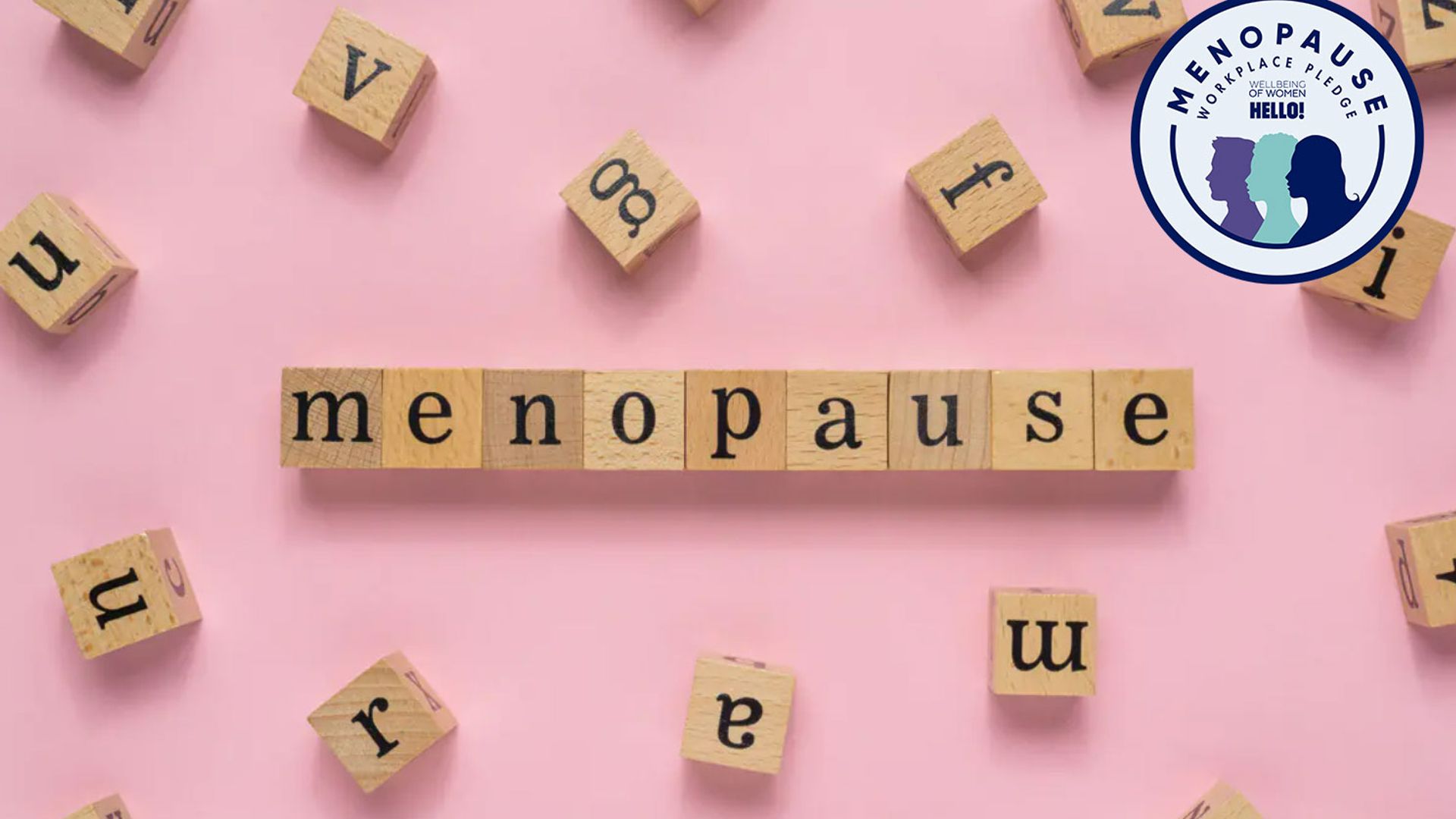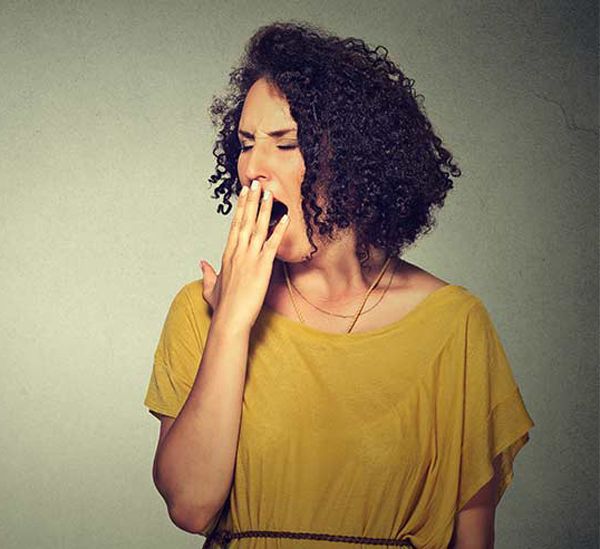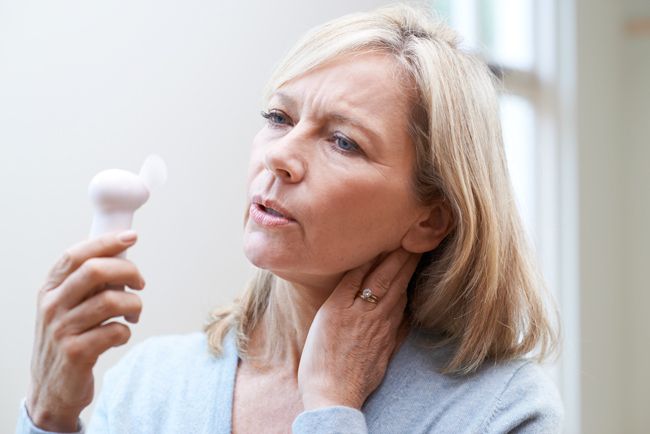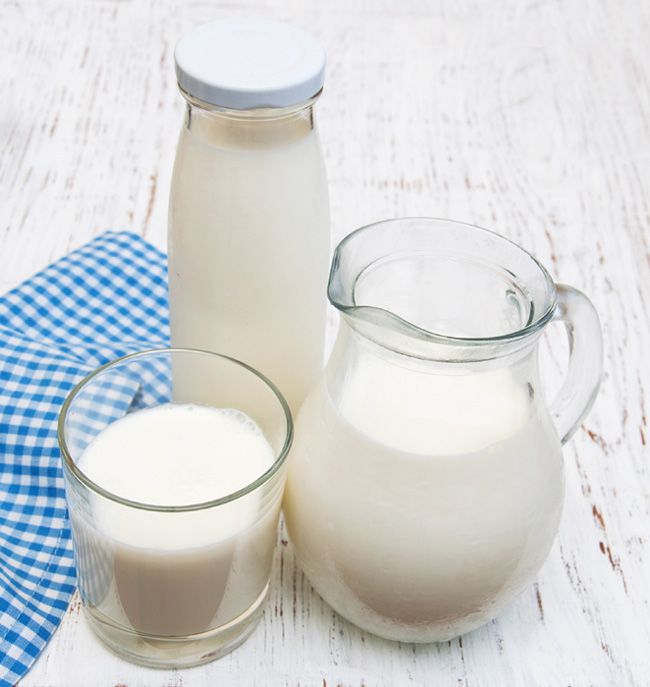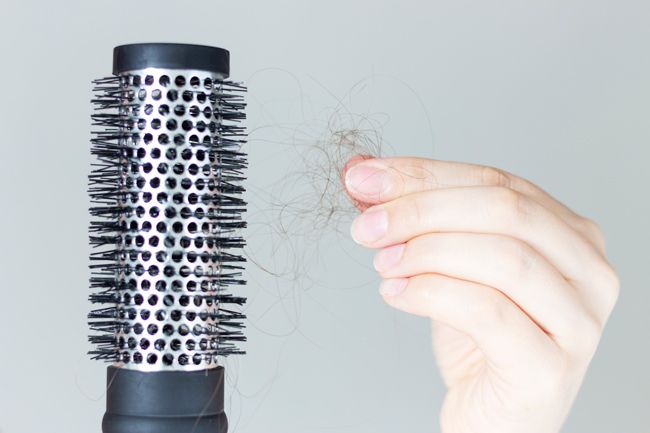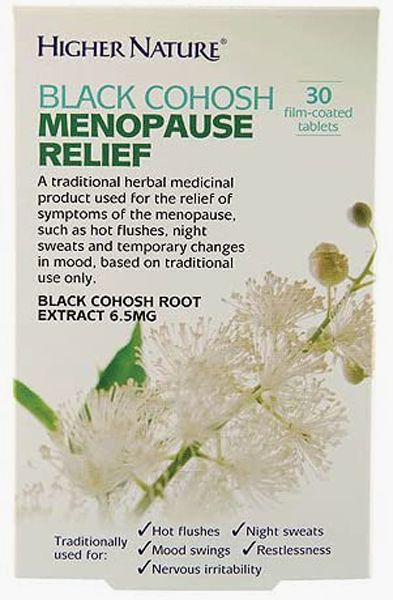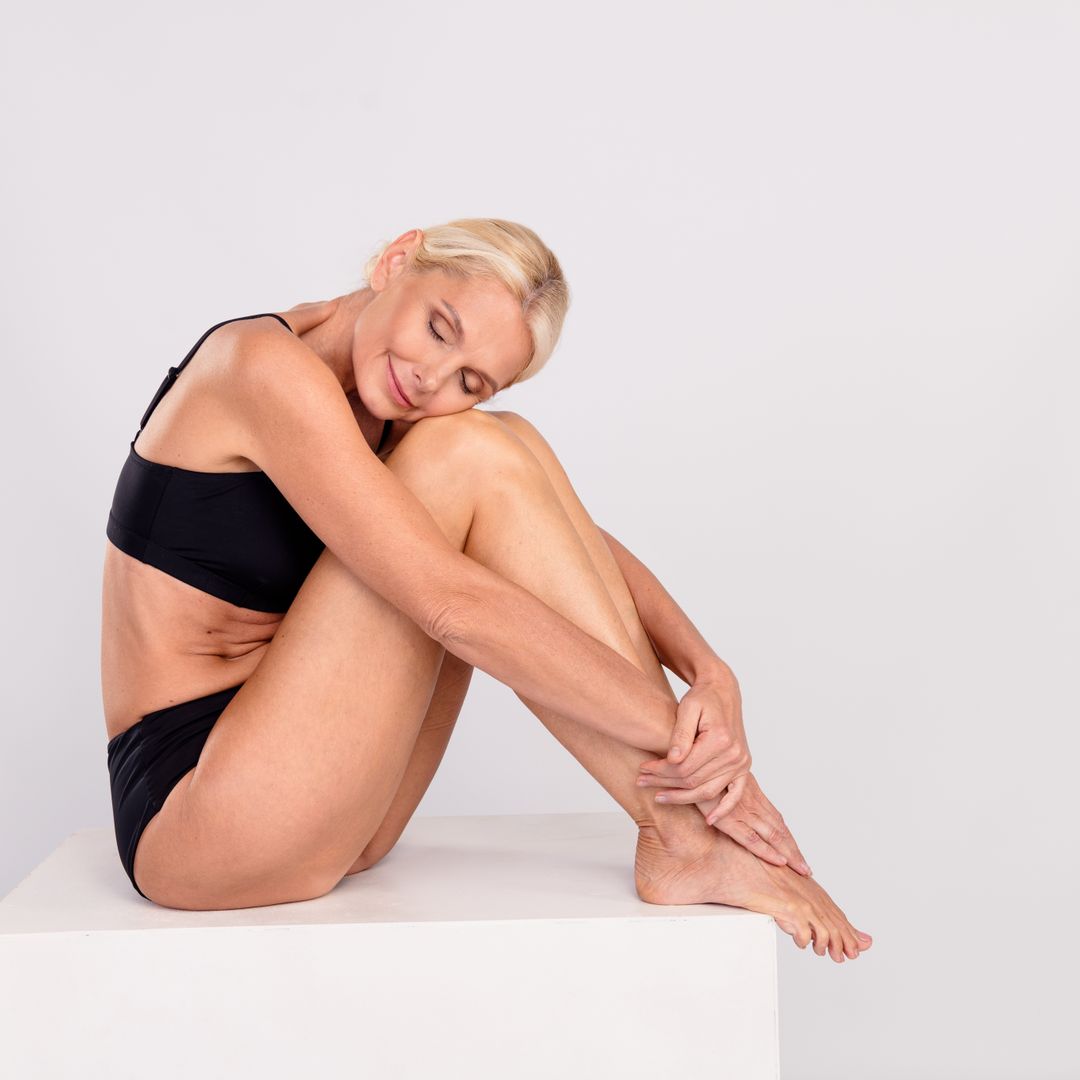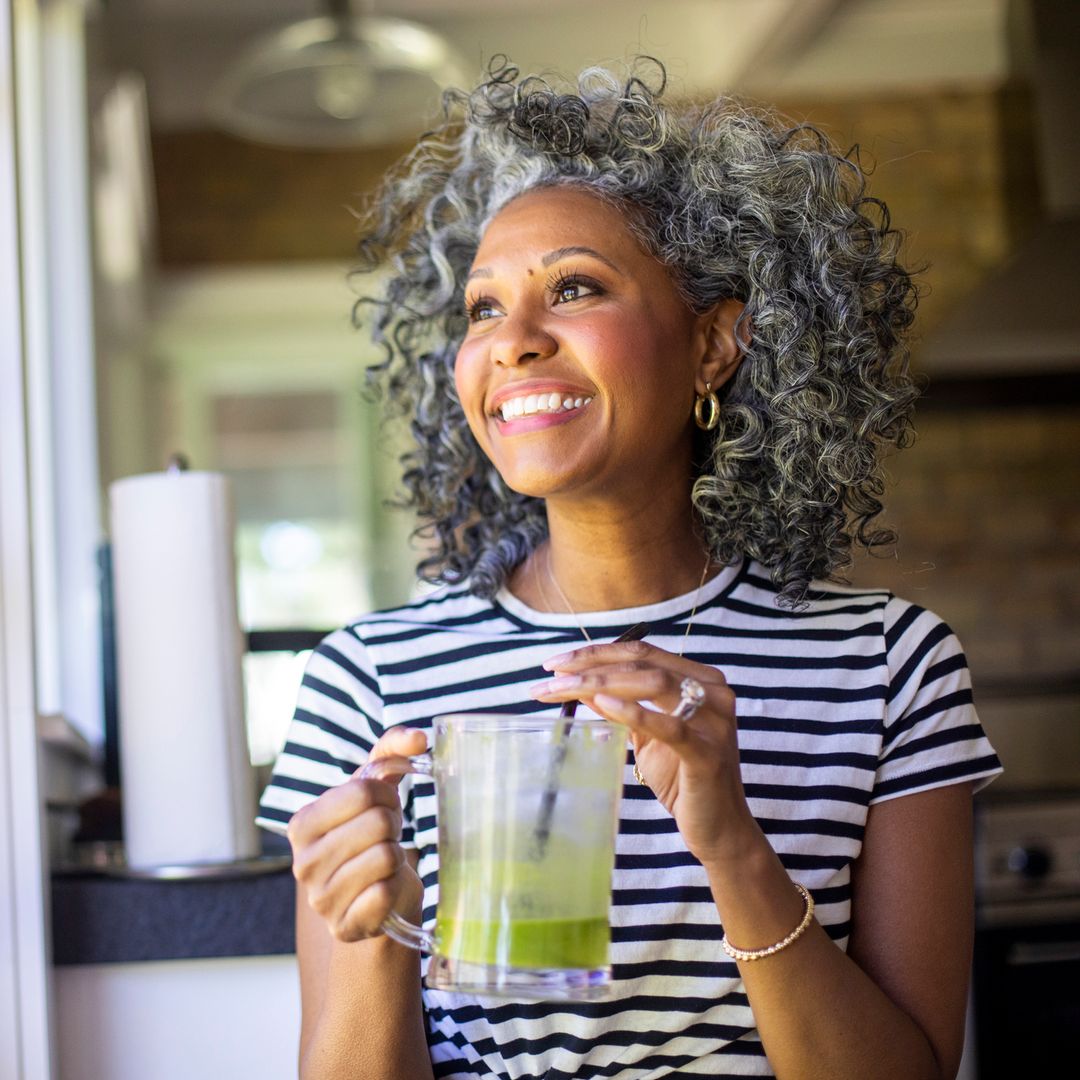Menopause (when a woman stops having periods and is no longer able to get pregnant naturally) affects women in different ways, but there are said to be around 36 symptoms. Some of the most common and well known side effects include hot flashes and changes in mood, but do you know what the others are? And how can you alleviate them?
RELATED: Penny Lancaster discusses 'horrific' menopause symptoms in candid interview
Dr. Shree Datta, gynecologist for intimate wellbeing brand INTIMINA, spoke to HELLO! about what menopause symptoms women can expect when they go through 'The Change' as it's sometimes known. Take note.
What are the first symptoms of menopause?
"Menopause is a natural process which is essentially when a woman stops having periods for over a year," says Dr. Shree Datta. "So can no longer get pregnant naturally. It usually happens between the ages of 45 and 55.
WATCH: Celebrity women being honest about the menopause
"The first symptom is usually a change in the nature of your periods - and how often you get them - over a few months or years before they stop completely.
MORE: 18 simple ways to get rid of water retention
"Other common symptoms include hot flashes, night sweats, difficulty sleeping, vaginal dryness, difficulty having sex, skin and hair changes, a change in mood and libido. You may also experience a change in your concentration or memory loss and joint stiffness. While most women will experience some menopausal symptoms, the severity and duration really varies from person to person. Women usually experience symptoms for 4-5 years after their last period - although they can last longer," Dr. Shree explained.
What are the symptoms of early menopause?
Dr Shree explains: "Around 1 in 100 women go through menopause before the age of 40 - this is known as premature menopause or premature ovarian insufficiency. The symptoms of early menopause are essentially the same but happen earlier than expected.
1 in 100 women go through the menopause before the age of 40, Dr. Shree explained
"Sometimes you can go through premature menopause after operations such as hysterectomy, or cancer treatments such as chemotherapy or radiotherapy. It can also stem from underlying medical conditions such as Addison's disease, or a family history of early menopause," she continued.
READ: The one food you should eat to push back the menopause
How long do the symptoms of menopause last?
The short answer is that it varies, depending on the individual. Dr Shree told HELLO!: "While most women will experience some menopausal symptoms, the type of symptom, severity and duration really varies from person to person. Women usually experience symptoms for 4-5 years after their last period - although they can last longer."
How does menopause affect your general wellbeing?
The British Beauty Council conducted an insightful paper that explores the impact of beauty on mental well-being, and there's a whole section dedicated to menopause. The paper states that almost a third of working women in the core 'menopause age' (aged between 50 and 64) are reluctantly take time out of the working week to alleviate menopausal symptoms. Across the year this mounts up to over 24 hours which has a potential productivity loss, across the UK female workforce, of 14 million working days. A blind trial, carried out on 50 participants aged between 45-65 years, demonstrates that therapeutic craniofacial (head and face) massage constitutes a complementary and valid therapy-based therapeutic option for clinicians in the treatment of different symptoms that occur in the climacteric period. For example, myofascial release (honing in on contracted muscles and connective tissue, stretching and restoring motion), deep tissue massage and lymphatic drainage has proven to deliver serious results.
What are the 36 symptoms of menopause?
1. Irregular periods: These are among the earlier symptoms of menopause. As Dr. Shree mentioned above, this can last for years before they stop completely.
2. Hot flashes: Women may experience sudden feelings of heat, usually in the face, neck and chest. They can be triggered by spicy foods, caffeine and alcohol.
MORE: Struggling to sleep? This smart 2-minute trick is a game changer
3. Night sweats: Hot flashes that occur at night are thought to be caused by changes in hormone levels affecting the body's temperature control.
Women may experience hot flushes, night sweats and headaches
4. Difficulty sleeping: Night sweats are often the culprit.
5. Fatigue: Menopausal fatigue could be the result of changes in the levels of hormones like estrogen, progesterone, thyroid hormones, and adrenal hormones which regulate energy. It's also not helped by the fact that, as previously noted, women struggle to sleep.
6. Changes in libido: Reduced libido can be caused by a drop in estrogen, but some women have reported an increased sex drive.
7. Problems with memory: Caused by fatigue and hormonal changes, forgetfulness is a common symptom of menopause.
8. Difficulty concentrating: This is thought to be caused, again, by decreasing estrogen levels.
9. Vaginal dryness: Changing estrogen levels can cause a lack of natural vaginal lubrication, causing discomfort, itchiness and even pain during sex.
10. Headaches: Tend to affect those who suffered with them during their periods. Headaches typically get worse as you approach menopause, partly because periods come more often and partly because the normal hormone cycle is disrupted.
RELATED: 14 wellness trends to try in 2021 that will help manage your anxiety
11. Mood changes: Some women experience mood swings (more extreme than those experienced during your period), low mood and anxiety.
12. Heart palpitations: An irregular heartbeat or increased heart rate may be caused by changing hormone levels.
13. Anxiety: The fluctuation of estrogen and progesterone can cause anxiety.
Consuming calcium-rich foods may help weak bones
14. Joint problems: This includes stiffness, aches and pains in the joints caused by decreasing estrogen levels and inflammation.
15. Reduced muscle mass: Women tend to lose muscle mass and gain abdominal fat around menopause.
16. Weight gain: Caused by hormonal changes, weight gain during menopause is especially common around your middle.
17. Recurrent UTIs: Menopause causes hormone changes that can increase your risk of urinary tract infections.
18. Incontinence: Up to 70% of women relate the onset of incontinence to their final menstrual period.
READ: Best skincare products for sensitive skin to try in 2021
19. Bloating: Bloating is an early sign of menopause.
20. Digestive issues: Aside from bloating, this includes nausea, abdominal cramps, constipation, diarrhea and more. The problems arise from increased cortisol.
21. Hair loss: Estrogen and progesterone levels decrease resulting in hair growing more slowly and becoming thinner. Age is also a factor.
22. Itchy skin: Thin, dry and itchy skin can be the result of lower estrogen levels impacting collagen.
23. Tingling extremities: A tingling or numb sensation in your fingers and toes may be caused by estrogen levels affecting your central nervous system.
Hair loss can be a symptom of menopause
24. Sore breasts: Similar to pregnancy symptoms, sore or tender breasts can happen around the menopause.
25. Gum problems: They can cause a metallic taste in your mouth.
26. Burning tongue: Decreased levels of saliva, likely due to reduced levels of estrogen, can lead to the sensation of a burning mouth, including the tongue, lips and roof of the mouth.
27. Feeling dizzy: Experiencing dizzy spells is supposedly associated with a drop in your estrogen levels.
28. Brittle nails: Weak, brittle nails that break easily is associated with lower estrogen levels weakening the keratin layer and dehydration.
29. Body odor: It is said that hormones have scents, which is why you may notice a change in your body odor during and after menopause – similar to pregnancy.
MORE: Nervous about visiting your GP? Here's why you shouldn't miss your smear test
30. Depression: Hormonal fluctuations put women at a higher risk of developing depression.
31. Panic disorder: While they're not thought to be a common symptom, panic attacks can be caused by a combination of other symptoms such as anxiety and palpitations.
32. Electric shocks: They are due to the inappropriate firing of neurons, often around hot flashes.
33. Allergies: Hormones and the immune system are closely linked, so women may notice allergies or intolerances during or after menopause.
34. Osteoporosis: Women may have an increased risk of osteoporosis, which causes the bones to crumble and become fragile, after menopause as bone density can drop by up to 20%.
35. Chills: While hot flashes are most common, chills can also be a side effect of the menopause since the fluctuating hormones can cause a dysfunction in the hypothalamus - the part of the brain that regulates body temperature. A dysfunction of the hypothalamus can cause your body to temporarily become over heated (hot flash) or chilled (cold flash).
36. Loss of breast fullness: As your levels of oestrogen drop, your natural milk system starts to shut down, meaning that glandular tissue in your breasts shrink, which causes them to become less dense and more fatty, which can cause sagging.
How can you treat the symptoms of menopause?
According to Dr. Shree, treatments can depend on factors such as age and lifestyle.
MORE: 7 ways to get rid of a tickly throat and cough fast
She said: "It's worth seeking advice from your doctor if you are finding the symptoms difficult to manage or overwhelming, particularly if you are experiencing symptoms before the age of 45. In some cases, the symptoms can be severe enough to affect your day-to-day activities.
Higher Nature black cohosh tablets, £8.44, Amazon
SHOP NOW
1. Lifestyle and dietary changes: "You may be asked to take a blood test to check your hormone levels before treatment is discussed with you. We may initially consider lifestyle and dietary changes, with regular exercise and lubricants to help with sex, but if this doesn't work, we may also consider medications.
2. Natural supplements: "We'll also look at holistic and natural supplements before considering hormonal medications.
3. Hormonal medication: Treatment can range from medications such as Hormone Replacement Therapy (HRT), vaginal estrogen creams, and behavior therapy. At this point, you may be referred to speak to a gynecologist and we will take into account any medical conditions or treatments you are currently taking."
You should also wear light clothing and take a cool shower for hot flashes, try yoga for mood changes, over-the-counter vaginal moisturizers for vaginal dryness, and eat plenty of calcium-rich foods for weak bones.
PHOTOS: 15 best ladies bikes for 2021: Get inspired by cycle-loving celebrities
HELLO!'s selection is editorial and independently chosen – we only feature items our editors love and approve of. HELLO! may collect a share of sales or other compensation from the links on this page. To find out more visit our FAQ page.
